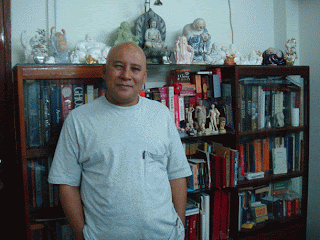
VietNamNet Bridge – Many of her peers are blind to corruption.
But 21-year-old Nguyen Thi Diem, a student in Ha Noi, is trying to lead a
truthful life.
Diem once went to a teacher's
house with the intention of bribing her to get higher marks so that she could
get a scholarship.
"I sat at a cafe next to her
house for several hours," the student said. "But I ultimately decided
not to go in. My decision meant I wouldn't get a scholarship. But if I'd done
it, I would have slipped into a vicious circle of bribery and corruption and
endless greed."
Le Van Lan, deputy head of the
office of the Central Steering Committee on Anti-corruption, says corruption
can be defined as someone using personal advantages to earn private benefits.
Corrupt deeds can be committed by anyone from young people to officials.
In Viet Nam, corruption is
steadily increasing. The country is ranked 123 out of 176 countries and
territories in corruption, he says.
The deputy head cites an anecdote
where a nine-year old student is assigned to report on her classmates'
progress. Some of her members, afraid their mistakes will be reported to the
teacher, give her candy and picture books in order to convince her not to tell
on them.
People laugh at this story and
think nothing of the incident. But to Lan, it reveals how corruption is deeply
embedded in Vietnamese society.
"When this student is small,
she doesn't have much power. But when she grows up, the stakes will be
higher," he said.
The country cannot grow and
become prosperous, emphasizes the deputy head, if the youngest generation fails
to lead a truthful life.
"Most of us, as young
people, think we have no power and assets so there is no chance for us to
commit corruption. However, corruption is not always at such a high
level," said Dang Ngoc Anh, leader of a student anti-corruption group.
The student used to assume only
receivers of bribes (such as traffic policemen) were culprits of corruption,
while those forced to give bribes were victims. But now, she says, she
understands that both parties are equally at fault.
Students also point out that
corruption and lack of transparency occur frequently at school. Whenever
examinations come, many teachers ask for money from students - or students
voluntarily give money to teachers to get the results they wish.
Wondering how the country can be
built up with such "blackened" hands, Anh and many other leaders of
anti-corruption groups have been hosting activities and events to change young
people's knowledge about corruption in ways that fit in with their daily lives.
Nguyen Thuy Hang, an official of
Live and Learn for Environment and Community, which has organised courses on
corruption and transparency for youth since 2009, says that after understanding
the true nature of corruption, many young people have taken an interest in
sharing their knowledge with others.
Many groups have formed online
forums where students can read about corruption and express their ideas and
experiences about living a truthful life and relations with teachers. Students
can also get advice on dealing with life situations in non-corrupt ways. Others
have hosted game shows and festivals to boost the image of honesty. Anh says
her group has organised dialogues between young people and experts and
published videos of meaningful life stories on this issue.
More than 4,500 students and
teachers have created and signed a code of conduct that aims to "form a
transparent studying environment in universities where there is no
corruption." Writing contests about corruption have drawn hundreds of
entries from young people.
While last year these events
focused directly on corruption, this year the focus is on leading a truthful
life, she said:
"When people acknowledge the
meaning of a truthful life, see their life from a different angle and then make
changes, the goals of anti-corruption are satisfied."
Statuses posted on online social
networks reflect these changes, she added, citing two examples: "Today I
dared to live truthfully and go against corruption by accepting my fault and
refusing to give money to a corrupt traffic policeman," "Today I did
not give money to a doctor but waited patiently in a long queue."
Since we all make choices in our
lives that lead us into certain situations, Anh concluded, "there is no
excuse for committing corruption and blaming it on the situation."
Diem's hope is even bolder.
"Young people will act as
the change agents of society," she said. "Our efforts to convey
perceptions of corruption to today's young people and orient them toward a
truthful life are like small waves which will disperse everywhere to make
thousands of other waves. There will be no ending. Being yourself in a world
trying to turn you into a liar - that's the best way to avoid corruption."
Source: VNS
Business & Investment Opportunities
Saigon Business Corporation Pte Ltd (SBC) is incorporated in Singapore since 1994. As Your Business Companion, we propose a range of services in Strategy, Investment and Management, focusing Health care and Life Science with expertise in ASEAN 's area.
We are currently changing the platform of www.yourvietnamexpert.com, if any request, please, contact directly Dr Christian SIODMAK, business strategist, owner and CEO of SBC at christian.siodmak@gmail.com. Many thanks.







.gif)





